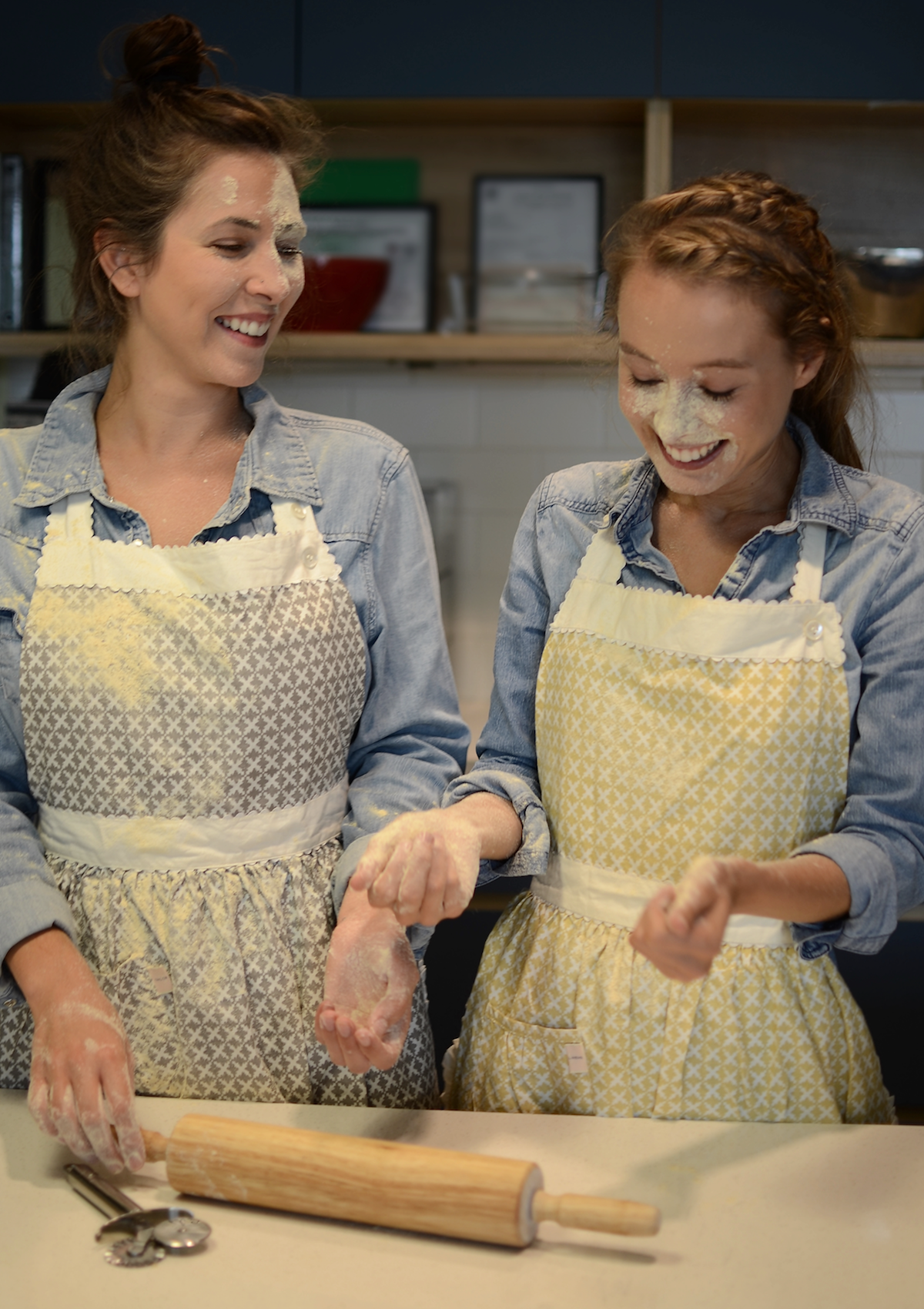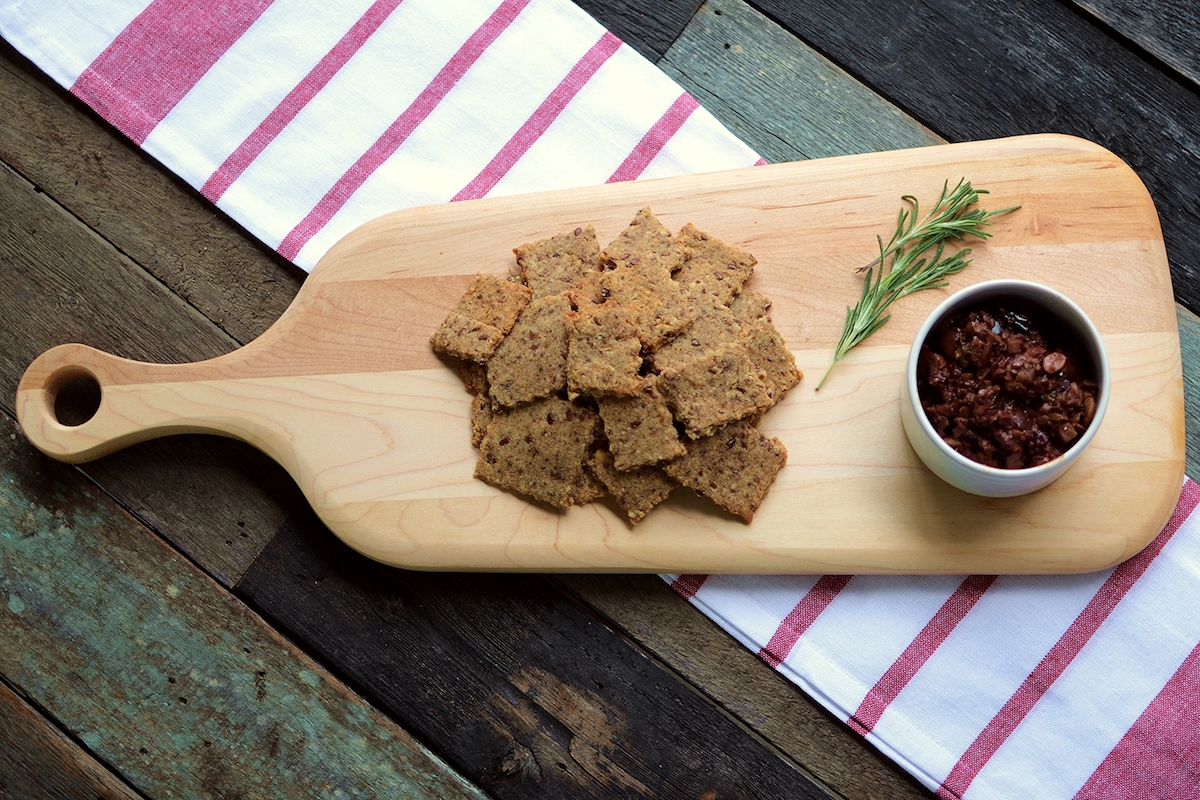
“Do not go where the path may lead, go instead where there is no path and leave a trail.”
(Ralph Waldo Emerson)
When Leah Jones and Megan McDonald first met in college, they had no idea their common interest in the environment would lead to the launch of a business. Yet, these two entrepreneurs have created a company that is good for the world with slightly unconventional products that are very, very tasty!
Leah and Megan are the founders of Crickers, a company that makes healthy and delicious snack foods out of cricket flour. Matt and I had the chance to meet up with Leah and Megan at Picnik, an amazing Paleo food truck in Austin. We were immediately struck by their passion and authenticity.
Their mission is to normalize the consumption of insects in the western world as a sustainable and nutritious food source, while supporting the insect eating traditions that the majority of other cultures in the world have embraced for thousands of years. Leah and Megan are well on their way to achieving this mission – earlier this year Crickers had a very successful Kickstarter campaign with 406 backers pledging $33,250!
With Halloween tomorrow, we hope this Something Significant interview inspires you to consider the health benefits of crickets vs. candy! If you want give Crickers Crackers a try, check out their online shop where you can order three different flavors: classic sea salt, rosemary garlic, and everything crackers. Yum! Happy Living readers can use the code HAPPYLIVING at checkout for 10% off anything on their website through Friday, November 6th at 5pm CST.

Tell us about yourself and how you got where you are today?
Leah Jones: Ever since I was a child, my passions have revolved around food, nature, and community. I am originally from Oklahoma City, but in 2007 I moved to Texas to earn my degree in Environmental Studies from Southwestern University. Getting involved in the environmental activism and sustainable food movement feels like something I was always meant to do.
Megan McDonald: You could say Crickers began when Leah and I met interning at an environmental nonprofit in college. We immediately became friends and later roommates. Crickers was born a few years later out of the culmination of our passions for environmental advocacy and healthy, delicious food! In addition to my role with Crickers, I’m a practicing psychotherapist in Austin, TX with a graduate degree in social work.
How has significance played a role in your journey?
LJ: From a young age, my parents taught me that doing something significant means using one’s gifts and talents to create something that brings joy or benefit to those around you. I try to live by my values, the things I believe to be true or of significance – not just in my career, but in small ways everyday – through my attitude, conversations, interactions, purchases, etc.
MM: Significance is really the only thing for me – I have a pretty low tolerance for superficiality. Significance, meaning, purpose or whatever you want to call it, is my constant guiding force, the reason why any of this matters. If it’s not significant, then what is it? Insignificant? One thing I’ve started to understand through my therapy practice is that everything is significant. The thing that moves something from insignificant to significant is the attention and awareness we give it. When I notice that I’m living without this perspective (on autopilot), I try to adjust my awareness and keep going.
Was there a specific moment or situation when you became aware of those things that are most significant to you?
LJ: In high school I attended a workshop put on by the Sierra Student Coalition, the student run branch of the Sierra Club. In one week I learned everything from how to build a coalition, facilitate a successful meeting, write a press release, and run a campaign to promote clean energy on my campus. That experience was a catalyst in many ways – it helped me discover my passion for environmental organizing and preservation, and showed me that I had power, even as a young person, to create meaningful change in my community. If I could create positive change through more environmentally conscious practices at my school, other schools might see that and be inspired to do the same.
MM: There wasn’t a specific moment, but from a very early age, I began to question my beliefs. Finding my own perspective and meaning of life became a predominant focus. Since then, my life has felt like my own personal science experiment – studying people, meaning, spirituality, etc.
The most significant thing to me is to continuously question and engage with the world. This perspective led me to environmental studies and activism in school, to questioning our food system and food I was putting in my body, and it is what got me interested in social work and psychotherapy. So, of course, when I heard about the practice of eating insects (aka entomophagy, a practice that 80% of countries in the world already enjoys) from an environmental and health perspective, I was super intrigued and eager to be a part of the mission.
What obstacles have you faced in your pursuit of significance? How did you overcome them?
LJ: The biggest obstacles I have faced started with fear – my fear of failure, my fear of things not working out the way I planned, or my fear of letting others’ down. As cliché as it sounds, the best way to overcome these fears is by acting out its opposite, love. Doing things out of love can be responding to situations with compassion and a positive attitude or viewing challenges as opportunities for problem-solving, learning, and growth.
MM: The biggest obstacle in my pursuit of significance is the temptation to go along with mainstream beliefs and activities. I’m pretty easy going, which is good in a lot ways, but it can make me too complacent. When this happens, I’m not engaging with what really matters to me. For example, the mainstream belief that “insects are gross” is a belief that I chose to reevaluate and ultimately decided to disagree with. Now a big part of my job lies in educating people on the health and environmental benefits of eating insects, so others can reevaluate their original beliefs.
What is one thing you wish you knew 10 years ago?
LJ: Keep moving forward. Do the best you can in the present moment, but then let it go and don’t look back.
MM: 10 years ago, I was fairly set on the idea of becoming a lawyer, like my parents and step-dad. The course seemed so clear to me then—I’d major in environmental studies, go to law school, and then become an environmental lawyer—safe in terms of job security and financial prospects (or so I thought at the time) and something I could respect myself for doing.
I wish I knew that it’s okay, and actually better, to explore interests and passions rather than to play it safe on the well-worn path (if only I had listened to Robert Frost earlier!). I’m glad I tried hard and was focused throughout school, but I think I missed out on other important learning activities while being so single-mindedly focused on academia. My decision to explore other career options towards the end of my college experience is something I’m really happy and proud that I did.
What is one hope you have for the next 10 years?
LJ: I hope eating bugs in America won’t be considered weird or gross. I hope that insect and other sustainable food & agricultural traditions that have been practiced for centuries will thrive and not disappear with globalization.
MM: I hope Crickers snack foods can be found in grocery stores and homes throughout the nation, and that with our help insects are seen as a normal part of the Western diet.
Are there any books or resources you would like to recommend to our readers?
LJ: The podcast Start Up, the United Nations Report on Edible Insects, Stuffed and Starved: The Hidden Battle for the World Food System by Raj Patel, Nature and Selected Essays by Ralph Waldo Emerson, Silent Spring by Rachel Carson, and writings by Vandana Shiva or Aldo Leopold.
MM: Edible: An Adventure into the World of Eating Insects and the Last Great Hope to Save the Planet by Daniella Martin, Mindsight by Daniel J Siegal, and Demian by Hermann Hesse.
Thanks again to Leah and Megan for this inspiring interview! Remember to visit the Crickers online shop and use the code HAPPYLIVING at checkout for 10% off your purchase through Friday, November 6th at 5pm CST.
Image via Crickers | This post may contain affiliate links, which means if you click and then purchase we will receive a small commission (at no additional cost to you). Thank you for reading & supporting Happy Living!

